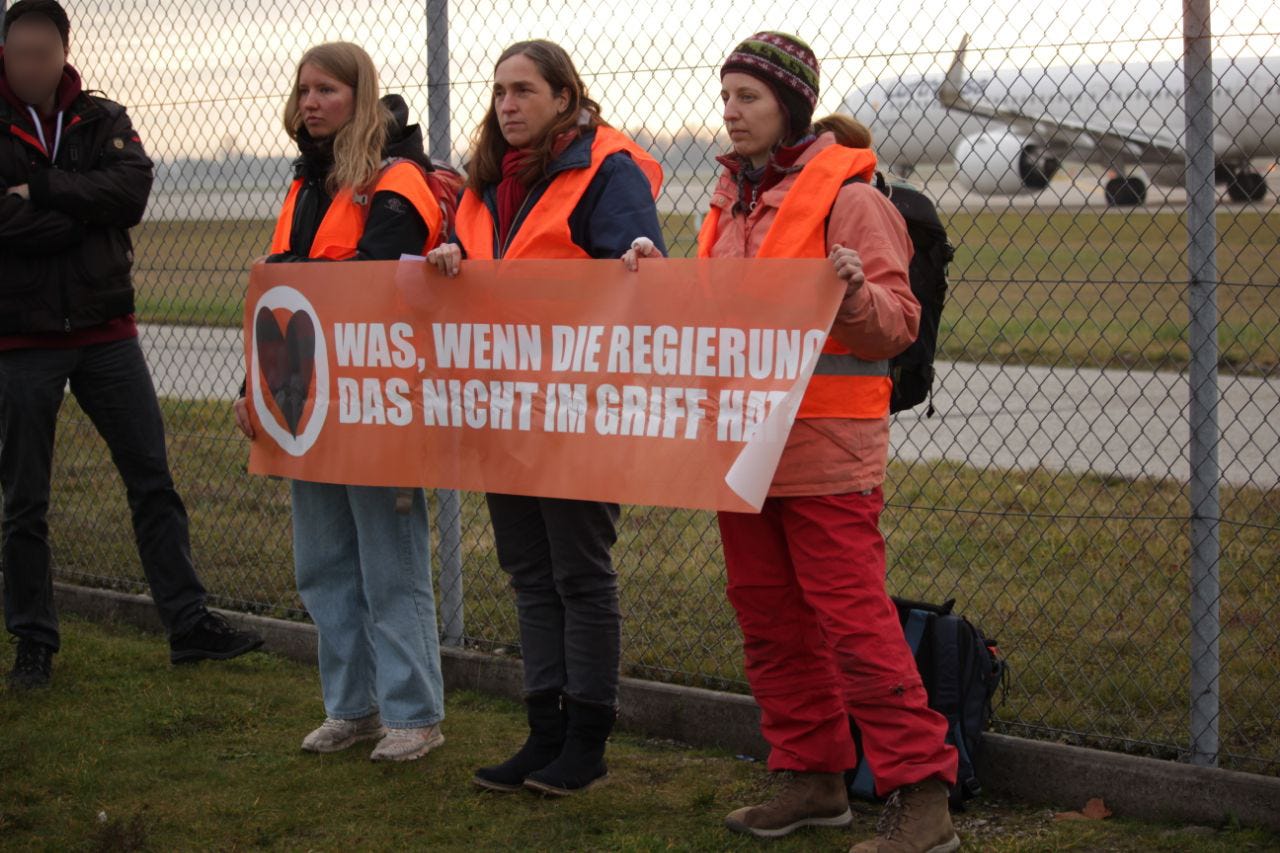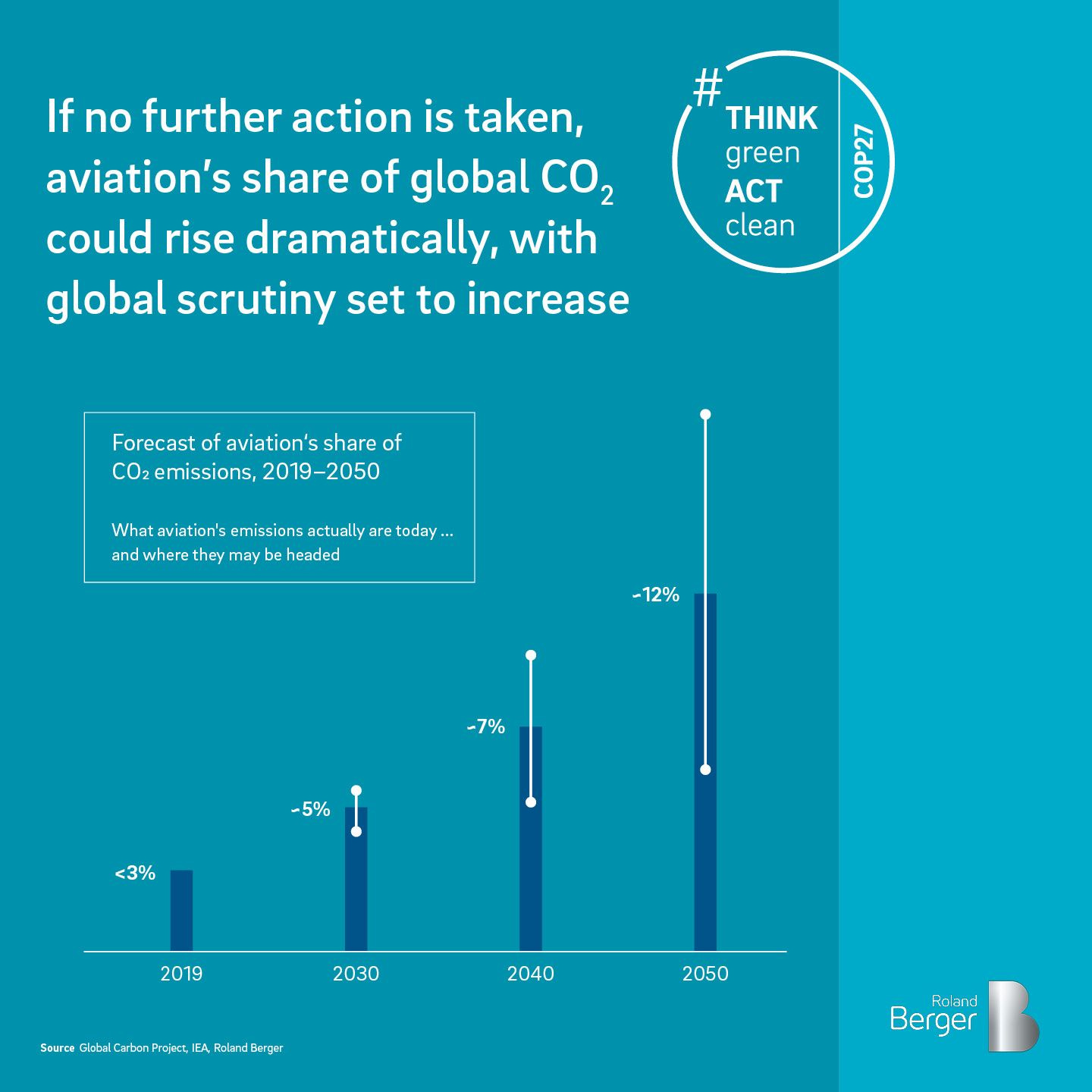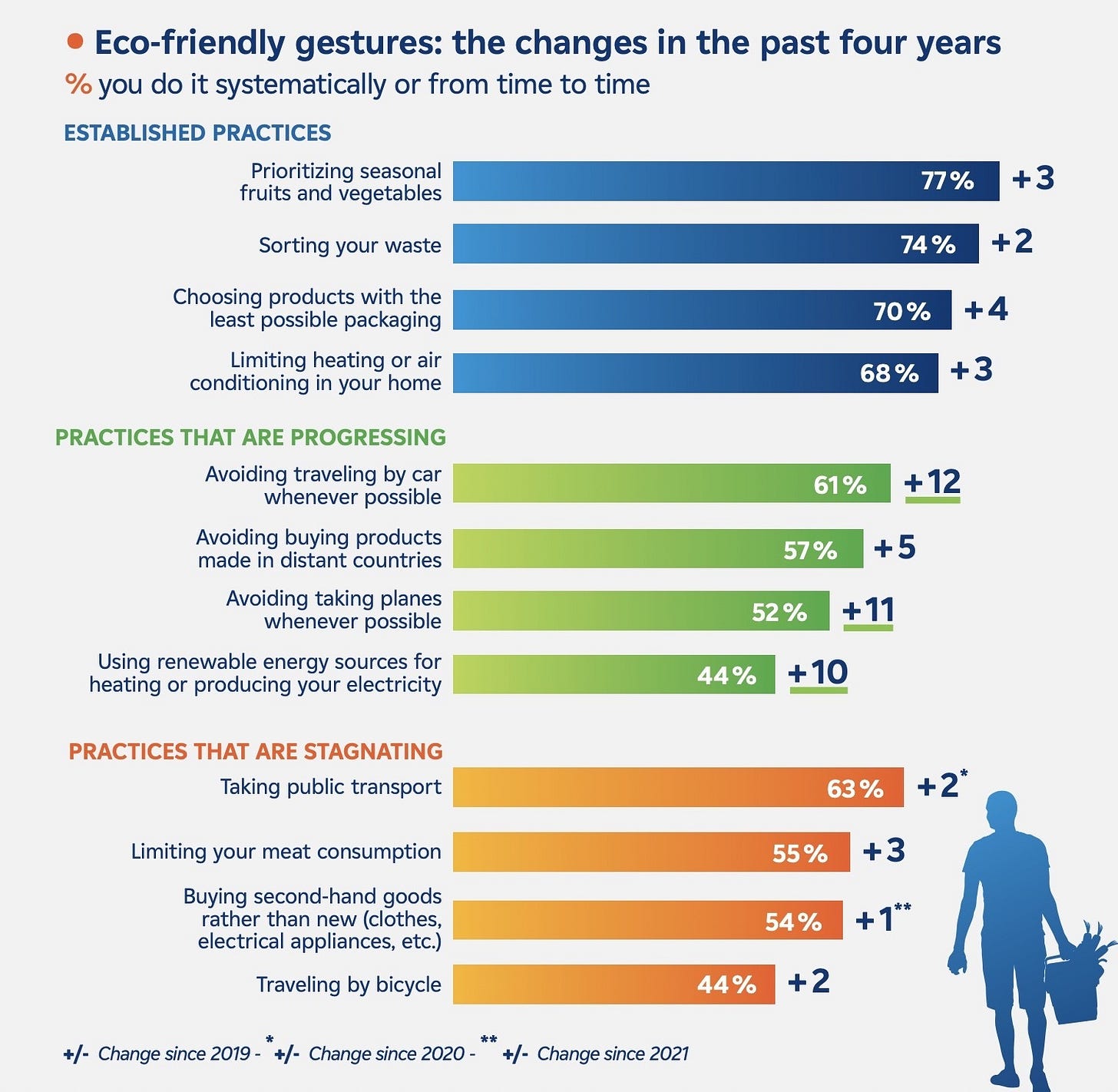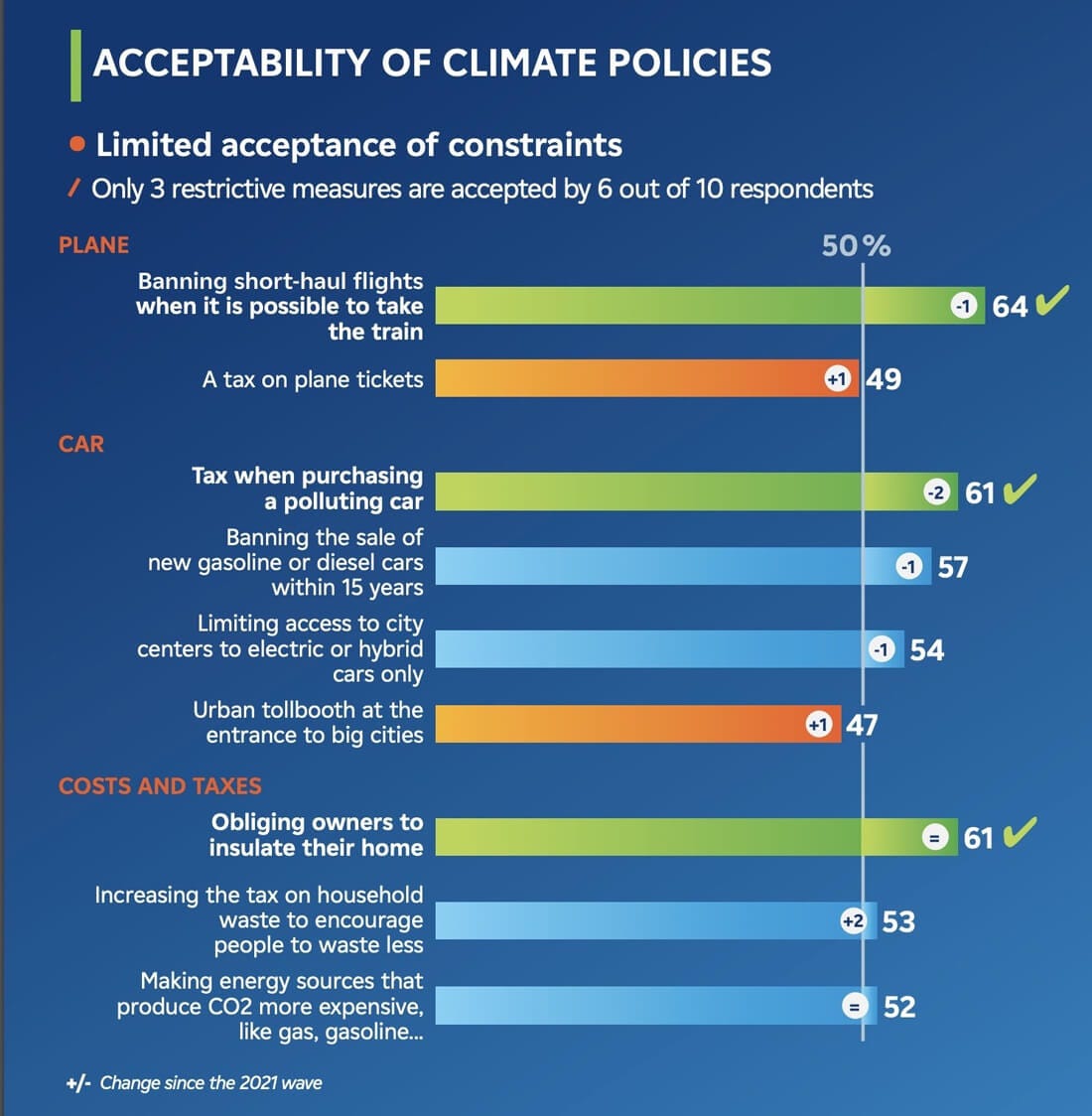“Why us?” A look at why climate change activists focus so much on aviation
Why are climate change activists targeting us? Isn’t aviation’s share of emissions only two or three per cent?
Introduction
In early December 2022, members of the German climate change group “Letzte Generation” (Last Generation) glued themselves to the taxiways at Munich and Berlin’s airports, causing the closure of one of Munich’s runways.
Commenting on the action, group spokesperson Aimée van Baalen said:
"In a burning world, there is no longer any neutrality. We can no longer watch in silence as a few rich people drive the world into the abyss on the backs of all people and devastate our common livelihood.”
This is the latest in a series of environmental protests targeting the aviation industry.
In November, for example, Greenpeace, Extinction Rebellion and other groups protested against private jets in both North America and Europe.
This included NASA Astrophysicist Peter Kalmus from ‘Scientist Rebellion’, who chained himself to the doors of the private aviation terminal at Charlotte Douglas International Airport.
Meanwhile, in the Netherlands, Dutch police arrested 200 climate change activists at Amsterdam’s Schiphol Airport who sat in front of the wheels of private jets to prevent them from leaving.
In the midst of all this, you sometimes hear the question being asked from within the industry:
Why are they targeting us? Isn’t aviation’s share of emissions only two or three per cent and aren’t there other industries that are responsible for much more global warming?
In this article, we’ve tried to answer that question. But in order to do that, we need to, first of all, take a step back and look at two core beliefs that all environmental groups have. We’ll also examine whether some of the arguments about aviation and climate change are starting to filter through to the general public - and the evidence is they are.
Two core beliefs of climate change groups
Core to the climate change movement are two beliefs.
The first is that we are in a climate emergency and that we are seeing the effects of global warming today. As a result, the planet is becoming increasingly less habitable.
It’s hard to disagree with that sentiment, considering the record temperatures in Europe and North America and the deadly floods in Pakistan and Bangladesh this year.
Given that the climate emergency is so existential, climate change activists wonder why we are even talking about anything else. And they are frustrated about the lack of action and what they perceive as a business-as-usual sentiment.
So as this is an emergency, really a life or death one, they then say that drastic steps are needed.
How drastic depends on the group in question. But often, this involves very visible direct action, generating media activity that allows their message to be heard.
The second view is that the root cause of the climate emergency is overconsumption by the so-called Global North, mainly at the expense of the Global South.
The plastic filling our oceans, for example, is due to us wanting ever more stuff. More stuff that’s made ever more cheaply and stuff we often don’t even need and so end up throwing away.
And, of course, greenhouse gases are burned to satisfy the growing demands of those consumer needs.
As a result, the proposed solution is both lifestyle changes on an individual level, as well as what Greta Thunberg calls a “system change.”
Writing in the Guardian, Thunberg said that “if everyone lived like we do in Sweden, we would need the resources of 4.2 planet Earths to sustain us” and that “3 billion people use less energy, on an annual per capita basis, than a standard American refrigerator.”
Aviation - the example of conspicuous, polluting consumption?
Bringing it back to aviation, climate groups point out that air travel involves burning an ever greater share of greenhouse gases. And that it’s done by a minority of the world’s population.
The ICCT’s recent frequent flyer levy report, for example, quotes sources saying that the top 1% of travellers, in terms of frequency of travel, are responsible for half of the emissions from flying. And that even in wealthy countries like the United States, 12% of people took 66% of flights.
In many ways, aviation is seen as the prime example of conspicuous and wasteful consumption. If anything, a lot of outward-facing marketing by the industry often reinforces that.
For example, University of Surrey academics Paul Hanna and Scott Cohen released a paper in the Journal of Travel Research titled “Reconfiguring aviation for a climate-safe future: Are airlines sending the wrong message?”
The paper breaks down airline marketing and says that it broadly follows three themes:
Adventure and discovery (e.g., “Check out these great destinations!”)
Privilege, travel confers status (e.g., “Take a look at our amazing lounges and service”)
Urgency (e.g., "Buy now in our sale!")
The authors concluded that “it is evident that the marketing efforts of airlines included in our analyses are designed to drive excessive demand and encourage over-consumption.”
On their point about ‘privilege’ and the idea of travel conferring status, you only need to look at the amount of marketing that happens around lie-flat beds, or private first-class suites, or award-winning cuisine or amazing new lounges. As the reality is – premium travel is profitable for airlines.
Taking all this into consideration, climate groups say that not only is the focus on aviation justified, but it’s also necessary.
Here they say, is a minority of the well-off taking needless fossil fuel-burning trips, where the ultimate price in global warming will be paid by everyone else.
What do climate change activists want?
As we said in our greenwashing report, many groups now want airline ads to be treated in the same way as alcohol or tobacco advertising with health warnings or restrictions or even to be banned outright.
They also want flying to be curbed, either through straight flight caps or through frequent flyer taxes, where the more you fly, the more you pay. And as far as industry sustainability efforts go, they don’t believe we are serious or go far enough.
They see most sustainability initiatives as nothing more than greenwashing - talk rather than action, to hide the fact that things are carrying on as normal.
This is reinforced by studies such as the one done by climate charity Possible, claiming that airlines missed 49/50 of published sustainability targets.
Is it fair?
Should aviation be, as some industry figures suggest, ‘educating’ consumers that aviation isn’t that bad? It’s ‘only’ two or three per cent, after all.
To answer that, it’s worth considering three points.
First of all, “look over there” is not a valid or persuasive argument. What other industries are or are not doing is not a reason for inaction. And in fact, if you look at other sectors, there is often a lot happening.
To take construction as one example, there’s a lot of work into making cement that is less carbon-intensive and, in some cases, even captures CO2.
In fact, the recent announcement about the CO2-capturing runway at Indianapolis Airport is a sign of how industries can work together on solutions.
Then, the industry’s share of emissions is growing. A recent report by Roland Berger says that 3% today could become 12% by 2050. Other studies put aviation's possible future share of emissions as high as 20%. Growth is outstripping aircraft efficiencies, and aviation’s share of emissions will increase compared to other industries.
Finally, we shouldn’t be afraid of scrutiny. It can help bring about improvements.
But what about the ultimate arbiter in this? The ticket-buying general public.
Do they agree that flying is environmentally and socially irresponsible? Is the social licence that the industry has had so far slipping? Though the picture here is complex, there is some evidence that it is.
What the public thinks
IPSOS-Mori conducts regular research internationally on attitudes to climate change.
Their latest report shows that the economic downturn and the aftermath of the pandemic have dampened concern worldwide about the environment. A bad economic climate means that bread-and-butter concerns often come first.
For example, when asked about whether priority should be given to growth and employment or the environment, a majority of respondents still chose the environment. But this majority, which was 53% for the environment in 2019 compared to 34% for growth, is gradually shrinking. Today the proportion is 48% vs 38%.
The study (commissioned by energy company EDF) also shows that while the environment is a top three concern in Europe and North America, it ranks far down in Africa and the Middle East.
In Asia, it is No 4, while in South America, it ranks in the middle.
But let’s look at the findings concerning air travel. Here a very different picture emerges.
52% said that they avoid taking flights at least from “time to time.” This is an increase over the past year of 11%. So on some level, the messaging about aviation is hitting home.
Meanwhile, 60%+ think it’s acceptable to ban short-haul flights when train travel is possible, and half think a frequent flyer tax is warranted.
Yet flights are full, and airports are crowded, to the extent that queues at major hubs like Amsterdam Schiphol and London Heathrow have made the news. They’ve even had to introduce flight caps to cope.
People might say they avoid flying. But the bums on seats evidence suggests otherwise.
Where is the disconnect coming from? There are a few possible reasons behind that.
First of all, most people don’t fly anyway. So ‘fly less’ is an easy answer for many. Then there is the value-action gap. People say they will act one way but actually end up doing something else. Added to that, in practice, the idea of voluntarily denying yourself something you enjoy isn’t very appealing.
Many environmental groups use what influential climate scientist Katherine Hayhoe has called “an ethos of denial.” Katherine Hayhoe questions its effectiveness.
But do the full flights of 2022 trump the growing concerns about aviation and the environment? Can executives just dismiss climate protestors as a noisy nuisance?
We’d argue no for four reasons.
1 - To take maybe the most obvious point. No one wants to live, or to pass on to our children, a warming planet complete with droughts, floods and the loss of natural habitats.
Decarbonising is the right thing to do.
2 - Secondly, we can debate the extent to which attitudes translate into actual action. Still, the IPSOS-MORI survey clearly shows that the messaging about aviation is beginning to sink in and that aviation is seen as a polluting industry.
And this is especially so for younger adults.
The 21-year-old Generation Z graduate of today is the middle manager of 2032 and the senior manager of 2042, so a potential frequent flyer. Or not.
As a result, we need to be aware of what tomorrow’s customers will think and how they will act.
3 - Corporate customers, who buy tens of thousands of tickets for their employees every year, are starting to listen.
The Travel Smart campaign tries to persuade businesses to cut their corporate travel in half, and many high-profile companies are starting to do that.
Meanwhile, major investors themselves continue to push for change.
This comes as the Financial Times reported about the world’s largest sovereign wealth fund, that of Norway, which holds an average of 1.5% of every listed company in the world.
From now on, the fund will vote against companies which don’t have net-zero targets.
4 - Finally, if none of the other arguments are appealing, here's another one. It’s good for business.
Consumers are more likely to buy from brands making a sustainability effort. We’ve talked about this before, the greenconsumption effect, and there is research to reinforce that point.
In particular, there was a study carried out involving headphones, a staple in most long-haul airline cabins.
Two groups of consumers were given the exact same songs to listen to, but the ones who were told the headphones were made out of recycled materials enjoyed it more.
Dialogue should be welcomed
We’ve detailed our recommended response in our separate greenwashing report, but in summary, we advise more storytelling, talking about what you are doing in easy-to-understand terms, as opposed to relying on easily shot-down net zero claims.
Of course, there, first of all, needs to be a story to tell. And working with groups like the Science Based Targets Initiative (SBTi) to measure your targets and programmes so that you are not marking your own homework.
But overall, we believe dialogue should be welcomed.
We’ll come back to the recent open letter Royal Schiphol Group CEO Ruud Sondag issued to climate groups coming to protest at AMS.
He didn’t dismiss them with ‘it’s only 3%.’ Instead, he talked about his personal commitment and that of the airport to net zero. He mentioned the importance AMS plays in the overall economy while accepting that the way we fly has to change.
And most importantly, he said climate change activists were welcome. So long as the debate is civil. That’s a good overall approach to take and one that we’d recommend and endorse.







